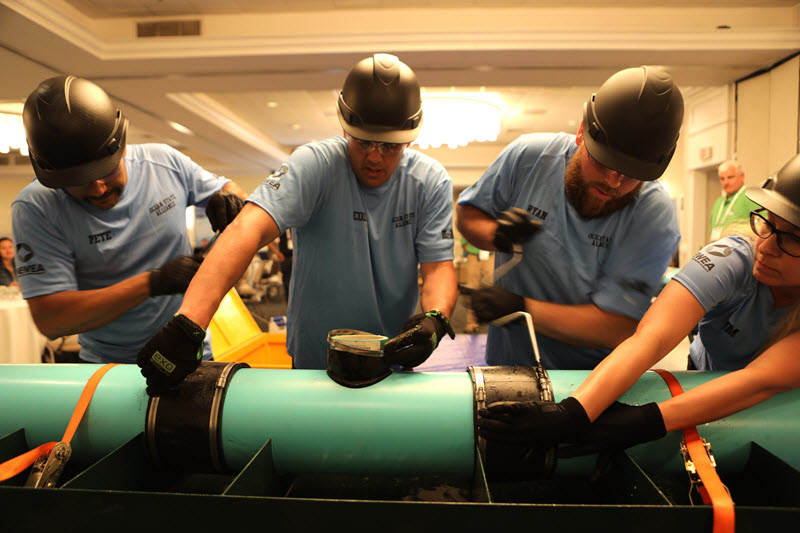Competing at Operations Challenge is no easy feat. According to past challengers, competition preparation requires dedicated time for year-round training, administrative and budget planning, and cooperation and sportsmanship. As much as it takes, challengers agree: it’s well worth it.
Operations Challenge is a team-based skills competition for wastewater professionals. The competition includes five events: Safety, Collections System, KSB Maintenance, Laboratory, Process Control. It features various components of operators’ daily responsibilities while also exposing competitors to new or emerging technologies and processes.
“It’s a lot of effort, because we practice for 6 to 8 months out of the year, but the rewards outweigh the time you put in,” said Eddie Davies, captain of Ocean State Alliance from the New England Water Environment Association.
“We are absolutely better operators because of this event,” said Ryan Patnode, an Ocean State Alliance team member. “Especially [when you come] from a small community, we get exposed to a lot of different processes and techniques that we don't have hands-on experience with, and we get to learn through all of this.”
Time
Training requires a significant time commitment especially when competitors have different schedules and may work at separate facilities. Some members of Ocean State Alliance started practicing during work hours (with company approval), others drove to afternoon team practices after their night shifts.
Patnode said that while preparing for Operations Challenge 2018, two team members — Pete Rojas and Davies — worked third shifts and Davies, also came to practice on his days off. Ocean State Alliance team members work at three different facilities and travel approximately 20 to 25 miles to practice during the week. They typically rotate practice locations to accommodate schedules and driving commitments.
However, Patnode added, “You almost forget about it because you don't hear any complaints about it from anyone.”
In addition to regular commutes for weekly practice, Ocean States Alliance and other New England-based Operations Challenge teams travel across states for the opportunity to practice with equipment that will be used in the competition. The equipment typically is too expensive for small communities to purchase. Trips to facilities in Maine, New Hampshire, or Massachusetts can take more than two or three hours.
Likewise, Jason Mank, team captain of the Ontario Clean Water Agency Jets, said that his team trains consistently throughout the year. The Jets resume practice shortly after WEFTEC and increase training frequency incrementally every month with extra practices before state competitions and WEFTEC.
 Members of Ocean State Alliance from the New England Water Environment Association compete at a regional event. (Courtesy Ocean State Alliance)
Members of Ocean State Alliance from the New England Water Environment Association compete at a regional event. (Courtesy Ocean State Alliance)
•••
Learn More About Operations Challenge



